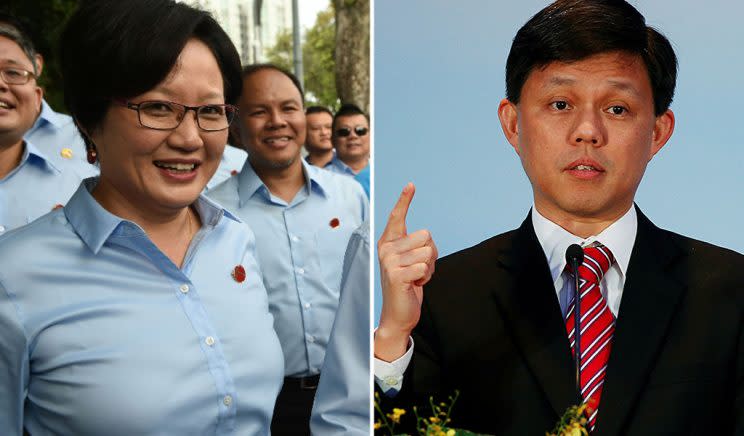Sylvia Lim, Chan Chun Sing spar over issue of first elected president

Workers’ Party chairman Sylvia Lim questioned in Parliament on Monday (6 February) whether the designation of Wee Kim Wee as Singapore’s first elected president was politically motivated, prompting a rebuttal from Minister from the Prime Minister’s Office Chan Chun Sing.
Lim and Chan were speaking during the debate on the Presidential Elections (Amendment) Bill.
Earlier Monday, Chan told the House that the next presidential election will be held in September. Chan also announced new campaigning rules for future elections.
Last November, Prime Minister Lee Hsien Loong announced in Parliament that the next election will be reserved for Malay candidates. Lee said that the government had received advice from the Attorney-General’s Chamber on how to apply the “hiatus-triggered mechanism” for reserved elections.
Under this mechanism, the presidential election should be reserved for candidates from a racial group if it is not represented for five terms, or 30 years, to ensure minority representation from time to time.
Lim said, “We were told that the advice was to count from President Wee Kim Wee who was then the first president to exercise the powers of an elected president. This advice was surprising and illogical to many Singaporeans given that President Wee Kim Wee was never elected to office.”
Wee was an appointed president in 1985, and during his second term, the Constitution was amended in 1991 to allow for direct presidential elections.
In response, Chan asked, “Are you suggesting the Attorney-General did not give the government the appropriate advice? Or that the Prime Minister has not been truthful with the Attorney-General’s advice?
“If it’s the first, then I think Miss Lim, as suggested by DPM Teo (Chee Hean), can challenge this in the courts. But if it’s the second, then I’m afraid it’s a very serious issue to cast aspersions on the integrity of our Prime Minister.”
Lim said the government’s decision to count from Wee as the first elected president was “arbitrary” and not a matter of getting legal advice to interpret any existing laws.
In 1993, Ong Teng Cheong succeeded Wee after he won the presidential election. Ong served one term and was succeeded in 1999 by S R Nathan, who served two terms before handing over in 2011 to President Tony Tan, who will step down in August after serving one term.
Lim questioned, “Why not count from the first elected president, Mr Ong Teng Cheong? Is it because if President Ong was the first one to be counted, we would have to go through this year’s election as an open election and risk the contest by Chinese or Indian candidates who may not be to the government’s liking?
Lim highlighted that if Ong was counted as the first elected president, only four terms would have passed by the next election.
But Chan explained that Wee had exercised the discretionary powers of an elected president during his second term. “President Wee Kim Wee was the first president to exercise the powers under the new Elected Presidency act,” he said.
Chan added that the amendments to the Bill were not for any short-term political gain, explaining that the “moving of this Bill carry with it high political risk with some political cost”.
He said, “We are here to build systems for Singapore for the long haul. Not for short-term political advantage, not for the political advantage of any particular parties. We are but stewards for our nation.”
The changes to the Presidential Elections Act were passed with all the People’s Action Party MPs in the House voting for them, while all the WP MPs and Nominated MP Kok Heng Leun voted against them.
During the debate, Chan inadvertently addressed Speaker of Parliament Halimah Yacob as “Madam President” twice instead of “Madam Speaker”, drawing laughter from the House.



